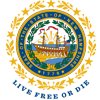Watershed Education Program
Fostering Knowledge Centered Around Our Aquatic Ecosystems
Attention teachers! New Hampshire Fish and Game has an exciting and free Watershed Education Program (WEP) that will put your students where the action is in their own watershed. Students will become Citizen Scientists, studying and working with local community partners to improve and maintain healthy aquatic ecosystems for fish and wildlife.
The program has a three phase format that is cohesively designed to be implemented as an entire package but can also be implemented separately. The program is aligned with Next Generation Science Standards (NGSS) and current NH science curriculum standards and frameworks, allows students to use the latest technology, and helps accomplish the goals of the fisheries division and the Wildlife Action Plan (WAP).
- Phase I: Water Quality Monitoring
- Phase II: Watershed Mapping and Land Use Assessment
- Phase III: Aquatic Resource Management
 Students visit their local water body to collect water samples to measure Dissolved oxygen, pH, Temperature, Turbidity, and Conductivity. They also collect and classify benthic macroinvertebrates. They use these chemical and biological parameters to define the water quality of their testing sites.
Students visit their local water body to collect water samples to measure Dissolved oxygen, pH, Temperature, Turbidity, and Conductivity. They also collect and classify benthic macroinvertebrates. They use these chemical and biological parameters to define the water quality of their testing sites.

Students are given the opportunity to explore their watershed through the use of Geographic Information System (ArcGIS) maps. This process can facilitate discussion about how human activities may impact the watershed and therefore the river. Using free ESRI educational software and online accounts, students learn to:
- Use and create ArcGIS maps
- Import local resource data about their own watersheds
- Use Global Positioning System (GPS) units to locate water quality testing sites
- Post and analyze water quality and macroinvertebrate data using the NHF&G statewide watershed map
- Share that data with the local community and other watershed schools

As an extension of studying the river, students can raise trout eggs in the classroom (Trout in the Classroom program) or study the behavior of fish with a warm water fish tank (Simulating a NH River Ecosystem program).
See Trout in the Classroom Video
Electrofishing: Students get to become fisheries biologists for a day to study the aquatic resources of a river onsite by helping "electrofish." New Hampshire Fish and Game staff will allow the students to experience fish sampling techniques, to perform a habitat assessment, and to collect, identify, and measure freshwater fish species.
Sign Up
To sign up for the Watershed Education Program at your school, contact Watershed Education Specialist Kayla Croteau at kayla.a.croteau@wildlife.nh.gov or call (603) 271-0456. Teachers who complete the required training will receive a NHF&G Department Watershed Education Program Teacher Manual.
Watershed Ecology Institute
The Watershed Ecology Institute (WEI) trains educators to use ArcGIS to study their local aquatic ecosystems. Educators will learn how to collect, map, analyze and share water quality and fisheries data sets from the NH Fish and Game Department and other schools. They will go back to school with access to free ArcGIS software and online technology and aquatic study tutorials to use in their classrooms. Instruction will be provided by various university and agency specialists and teachers themselves! If you have any questions, please contact Watershed Education Specialist Kayla Croteau at kayla.a.croteau@wildlife.nh.gov

Wildlife & Sportfish Restoration Program
Wildlife & Sportfish Restoration Program
Aquatic WILD is part of Project WILD, an international conservation and environmental education program developed by the Association of Fish and Wildlife Agencies that focuses on wildlife and habitat. To learn more visit www.fishwildlife.org/projectwild.



